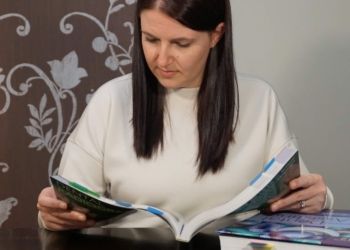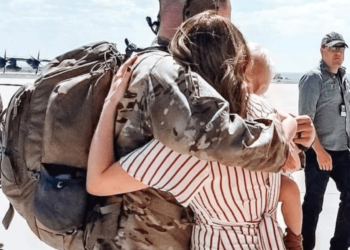When Lynn Marchessault set out for her family’s move in late Nov. 2020 from Georgia to Alaska she knew that there would be unforeseen hiccups along the way. After all, it is 2020 and what would a permanent change of station (PCS) driven across two countries be without a few bumps in the road along the way?
Unlike her several other PCS’s, this time Marchessault was on her own. Her husband, Army Staff Sgt. Timothy Marchessault, deployed in early 2020 and she moved back home to Georgia. Her husband had planned to transition out of the military so Lynn decided she and the kids would go to their home state to set up a new house and get settled while he was gone. But then he decided to re-enlist so it was up to Marchessault to pack up all their belongings and head back to Alaska on her own.
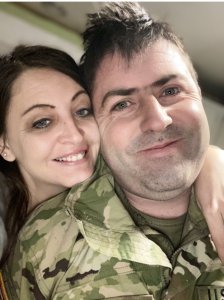
Because of the travel restrictions due to COVID-19, Marchessault’s husband wasn’t allowed to go to Georgia to help Marchessault drive back to Alaska once he returned from deployment. And although they had flown to Georgia when her husband left, when it was time to head back to Alaska, Marchessault needed to drive with all their personal belongings they had acquired when they thought they were settling down in Georgia. So with two kids, two dogs, and a cat making the long drive Marchessault bought a brand new truck and hooked up a 6 x 12 trailer to tow all of their things with them.
Although Marchessault had driven with a trailer before, she was still nervous about this PCS from the beginning.
“This time I was driving by myself, going a lot further than I had ever driven before. We are from the South and I had never really driven in snow. I couldn’t sleep for two or three weeks before the drive because I was so nervous,” Marchessault said.
So far, so good
After a delay due to travel documents, Marchessault, her children and their pets finally set out on the road to Alaska. They were supposed to leave in September when the weather would have been markedly better, but now they weren’t started the journey until November. But driving through the United States was fine and they were making good progress.
“[For] the first four days — two in the U.S. and two in Canada — we were trucking along pretty nicely. But once we hit Alberta, Canada, the driving conditions got worse,” she said.
“It was just completely white and covered in snow”
It was here, on the Alaska-Canadian Highway also known as ALCAN, that Marchessault realized that she wasn’t completely prepared for the blizzard-like weather conditions.
“This is a major trucking highway and trucks were just blowing past me. I couldn’t see the car in front of me or the cars behind me. It was just completely white and covered in snow.”
It wasn’t just the weather that was causing problems either. Marchessault had no cell phone service while in Canada so she couldn’t get in touch with anyone, including her husband, until she stopped for the night and got on the hotel’s Wi-Fi.
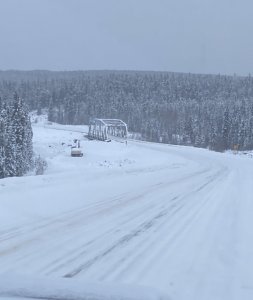
In addition, the trailer’s wheels kept losing traction during the drive since the tires weren’t made for such snowy and icy conditions. Her windshield wiper pump also stopped working, which meant she couldn’t clean her windshield properly throughout the drive.
“At some point, I stopped at a gas station and got… four or five bottles of windshield wiper fluid. If I needed to really clean the windshield, I would have to stop and splash it on,” she said.
Marchessault kept going but drive was taking a toll on her — emotionally, mentally and physically. She made it to Grand Prairie in Alberta, Canada where she stopped to get gas. Her children went to use the restroom inside and Marchessault broke down in tears. She didn’t feel like she could finish the drive and the stress it was taking on her was almost unbearable.
It was then that a “guardian angel” came out to see if she was ok.
The gas station attendant, Tina, asked Marchessault what was wrong. Marchessault said everything came flooding out.
“I told her everything. And she just listened and asked how she could help,” Marchessault said.
Tina told Marchessault that her tires were not all-weather tires like the dealership had told her, but rather summer-weather tires. She would never be able to continue the journey with the weather conditions like they were.
Tina then helped Marchessault find a tire shop to switch out her summer-tires for all-weather tires.
Remembering the advice of other military spouses
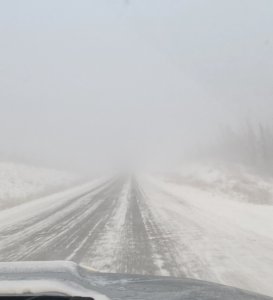
Earlier in the trip when the weather had started to take a turn for the worst, Marchessault had reached out to Fort Wainwright spouse Facebook groups to get advice on how to continue. Although some people told her she never should have made the drive alone in the first place, some offered valuable pieces of advice, one of which was to look at the ALCAN Highway Facebook page for help and another mentioned that there were traffic cameras set up along the Yukon 511 so she could see weather conditions in real-time. One spouse mentioned that there are opportunities to hire an experienced driver to drive you along the ALCAN.
But that last piece of advice didn’t really resonate with Marchessault until she was in Grand Prarie at the tire shop.
“I felt like things were finally coming into place at this point. It was a Sunday so I didn’t think the shop would be open. But the guy was there waiting on someone else … When I told him the size of my tires he said he thought he only had one set left, and he did. They switched my tires — took my trailer off, and hooked it back on — and gave my kids and dogs some time to run around in the snow. Tina stayed with me the whole time to keep me company,” Marchessault said.
A good samaritan helps the Marchessaults get home to Alaska
It was then that Marchessault made a comment about someone driving her the rest of the way because, even with the new tires, she wasn’t confident she could do it on her own. Tina put out a request on a Facebook group and within hours she was in touch with Gary Bath, a ranger whose job includes training members of the Canadian military to survive the Arctic.
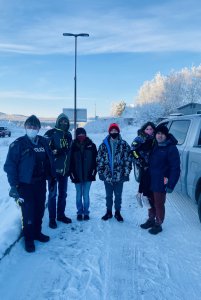
After some discussion with her husband, who was not thrilled with the idea of a stranger driving their family the 1,000 miles to the Alaska border, Marchessault decided to take a leap of faith and have Bath drive them the rest of the way.
“I am a pretty good judge of character and as soon as I met Gary and his wife, I knew they were good people,” Marchessault said.
After a few Facetime calls with Bath and her husband about the rest of the trip, the Marchessaults and their new friend were on their way. With Bath’s extensive experience on the ALCAN and his past military experience, Marchessault was confident and comfortable the rest of the way there.
“[Bath] was so nice. He was like an extra grandparent. He would play games with the kids in the car. We have been adopted by this nice Canadian family.”
Lessons from being a military spouse
Once they got to the border, Marchessault handed her documents to the authorities and Bath made arrangements to head back to Alberta, Canada. In the end, Marchessault credits her life as a military spouse for making the tough decisions during a dual-cross country PCS on her own.
“Being a military spouse helped me to improvise — like when I had to clean the windshield by splashing fluid [on it]. I also feel like I was resilient, and I was able to make these tough decisions when I needed to, without any communication from my husband [in a given moment].”
Marchessault also notes that the days were very long, and she was often, mentally, lonely. All of which are reminiscent of a deployment.
One day, she thinks she will look back on this story and laugh. But for right now, she doesn’t want to be anywhere near the snow.
“I still won’t drive out here. I make my husband drive everywhere. I can’t wait to be away from the snow,” she said laughing.
Read comments




















